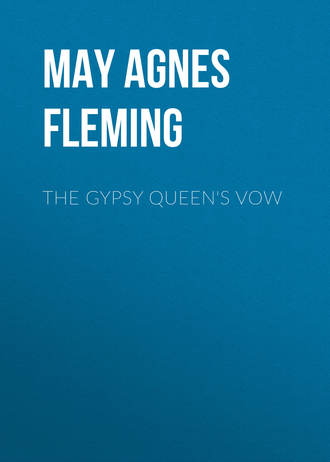 полная версия
полная версияThe Gypsy Queen's Vow
Two young men stood together within the deep shadow of a bay-window, in the music-room, watching a group assembled round a young lady at the piano, and conversing in low tones.
One of these was decidedly the handsomest man present that night. In stature he was tall, somewhat above the common height, and faultless in form and figure, with a certain air of distingue about him that stamped him as one of noble birth. His clear, fair complexion, his curling chestnut hair, and large blue eyes, betrayed his Saxon blood. His face might have seemed slightly effeminate; but no one, in looking at the high, kingly brow, the dark, flashing eyes, and firm-set mouth, would have thought that long. A dark mustache shaded his upper lip, and a strange, nameless beauty lit up and softened his handsome face whenever he smiled. Adored by the ladies, envied by the men, Lord Ernest Villiers, only son of Earl De Courcy, seemed to have nothing on earth left to wish for.
And yet, at times, over that white, intellectual brow a dark shadow would flit; from the depths of those dark, handsome eyes the bright light of a happy heart would pass; the mouth would grow stern, and a look of troubled care would darken his young face.
His companion, a good-looking young man, with a certain air about him as if he were somebody and knew it, with a listless look, and most desirable curling whiskers, leaned against a marble Hebe, and listened languidly to the singing. He wore the undress uniform of an officer, and being interpreted, was no other than Captain George Jernyngham, of the Guards.
“What a wonderful affair this is of Germaine’s – eh, Villiers?” said Captain Jernyngham, carressing his mustache. “Just like a thing in a play, or a story, where everybody turns out the most unexpected things. The Duke of B – is going crazy about it. He had invited Germaine to his house, and the fellow was making the fiercest sort of love to his pretty daughter, when all of a sudden, it turns out that he is a robber, a gipsy, a burglar, and all sorts of horrors. How the deuce came it to pass that he entered Eton with us, and passed himself off as a gentleman?”
“I cannot tell; the whole affair is involved in mystery.”
“You and he were pretty intimate – were you not, my lord?”
“Yes, I took a fancy to Germaine from the first; and I don’t believe, yet, he is guilty of the crime they charge him with.”
“You don’t, eh? See what it is to have faith in human nature! How are you to get over the evidence.”
“It was only circumstantial.”
“Granted; but it was most conclusive. There is not another man in London has the slightest doubt of his guilt but yourself.”
“Poor Germaine!” said Lord Villiers, in a tone of deep feeling; “with all his brilliant talents, his high endowments, and refined nature, to come to such a sad end! To be obliged to mate with the lowest of the low, the vilest of the vile – men degraded by every species of crime, below the level of the brute! And this for life! Poor Germaine!”
The young guardsman shrugged his shoulders.
“If refined men will steal – oh, I forgot! you don’t believe it,” he said, as Lord Villiers made an impatient motion, “Well, I confess, I thought better things of Germaine myself. There was always something of the dare-devil in him, and he was reckless and extravagant to a fault; but upon my honor, I never thought he could have come to this. Have you seen him since his trial?”
“No, I had not the heart to meet him. Death would be preferable to such a fate.”
“There was a devil in his eye, if there ever was in any man’s, when he heard his sentence,” observed the young captain. “No one that saw him is likely to forget, in a hurry, the way he folded his arms and smiled in the judge’s face, as he pronounced it. By Jove! I’m not given to nervousness, but I felt a sensation akin to an ague-shiver, as I watched him.”
“With his fierce, passionate nature, it will, turn him into a perfect demon,” said Lord Villiers; “and if ever he escapes, woe to those who have caused his disgrace! He is as implacable as death or doom in his hate – as relentless as a Corsican in his vengeance.”
“Has he any friends or relatives among the gipsies?”
“I don’t know, I think I heard of a mother, or brother, or something. I intend paying him a last visit to-night, and will deliver any message he may send to his friends.”
“Will your rigorous father approve of such a visit, since it was he that prosecuted Germaine?”
“Certainly, Jernyngham. My father, believing in his guilt, thought it his duty to do so; but he bears no feeling of personal anger toward him,” said Lord Villiers, gravely.
“Well, I wish Germaine a safe passage across the ocean,” said Captain Jernyngham, as he listlessly admired his hand in its well-fitting glove. “He was a confoundedly good-looking fellow; cut me completely out with that pretty little prize widow of old Sir Rob Landers; but I’ll be magnanimous and forgive him now. Oh, by Jove! Villiers, there goes Lady Maude Percy!” cried the guardsman, starting suddenly up, all his listlessness disappearing as if by magic. “Ye gods! what a perfectly dazzling beauty! Ah! my lord, I thought you would find the subject more interesting than that of poor Germaine,” he added, with a mischievous smile at his companion’s look of intense admiration.
Lord Villiers laughed, and his clear face flushed.
“The handsomest girl in London, and the greatest heiress,” said the guardsman, resuming his half-drawl and languid caressing of his whiskers. “What an intensely enviable fellow you are, Villiers, if rumor is true.”
“And what says rumor?” said Lord Villiers, coldly.
“Why, that you are the accepted lover of the fair Lady Maude.”
Before the somewhat haughty reply of Lord Villiers was spoken, a young lady, suddenly entering the room, caught sight of them, and coming over, she addressed the guardsman with:
“George, you abominably lazy fellow, have you forgotten you are engaged for this set to Miss Ashton? Really, my lord, you and this idle brother of mine ought to be ashamed to make hermits of yourselves in this way, while so many bright eyes are watching for your coming. Lady Maude is here, and I will report you.”
And, raising her finger warningly, Miss Jernyngham tripped away.
“‘Fare thee well – and if forever!’” said Captain Jernyngham, in a tragic tone, as he turned away.
“‘Why, forever fare thee well!’” said Lord Villiers laughing as he finished the quotation, and turned in an opposite direction.
The dancing was at its height as he passed from the music-room. Standing a little apart, his eyes went wandering over the fair forms tripping through the “mazy dance,” while they rested on one form fairer than all the rest, and his handsome face brightened, and his fine eyes lit up, as a man’s alone does, when he watches the woman he loves.
Standing at the head of one of the quadrilles was the object of his gaze – the peerless, high-born Lady Maude Percy. Eighteen summers had scarce passed over her young head, yet a thoughtful, almost sad, expression ever fell like a shadow on her beautiful face. Her form was rounded, exquisite, perfect; her oval face perfectly colorless, save for the full, crimson lips, her eyes large, dark and lustrous as stars, and fringed by long, silken-blacken lashes; her shining hair fell in soft, glittering, spiral curls, like raveled silk, round her fair, moonlight face; and her pallor seemed deepened by its raven hue. Her dress was of white brocade, fringed with seed-pearls; and her snowy arms and neck gleamed through misty clouds of point-lace. Pale, oriental pearls, wreathed her midnight hair, and ran in rivers of light around her neck. Queenly, peerless, dazzling, she moved through the brilliant train of beauties, eclipsing them all, as a meteor outshines lesser stars.
Drinking in the enchanting draught of her beauty to intoxication, Lord Ernest Villiers stood leaning against a marble pillar until the dance was concluded; and then moving toward her, as she stood for an instant alone, he bent over her, and whispered, in a voice that was low but full of passion:
“Maude! Maude! why have you tried to avoid me all the evening? I must see you! I must speak to you in private! I must hear my destiny from your lips tonight!”
At the first sound of his voice she had started quickly, and the “eloquent blood” had flooded cheek and bosom with its rosy light; but as he went on it faded away, and a sort of shiver passed through her frame as he ceased.
“Come with me into the music-room – it is deserted now,” he said, drawing her arm through his. “There, apart from all those prying eyes, I can learn my fate.”
Paler still grew the pale face of the lady; but, without a word, she suffered herself to be led to the shadowy and deserted room he had just left.
“And now, Maude – my own love – may I claim an answer to the question I asked you last night?” he said, bending over her.
“I answered you then, my lord,” she said, sadly.
“Yes; you told me to go – to forget you; as if such a thing were possible. Maude, I cannot, I will take that for an answer. Tell me, do you love me?”
“Oh, Ernest – oh, my dear lord! you know I do!” she cried, passionately.
“Then, Maude – my beautiful one – will you not be mine – my wife?”
“Oh, I cannot! I cannot! Oh, Ernest, I cannot!” she said, with a convulsive shudder.
“Cannot! And why, in Heaven’s name?”
“My lord, that is my secret. I can never, never be your wife. Choose some one worthier of you, and forget Maude Percy.”
She tried to steady her voice, but a stifled sob finished the sentence.
For all answer he gathered her in his strong arms, and her head dropped on his shoulder.
“My poor little romantic Maude, what is this wonderful secret?” he said, smiling. “Tell me, and we will see if your mountain does not turn out a molehill after all. Now, why cannot you be my wife?”
“You think me weak and silly, my lord,” she said, raising her head somewhat proudly, and withdrawing from his retaining arms; “but there is a reason, one sufficient to separate us forever – one that neither you nor any living mortal can ever know!”
“And you refuse to tell this reason? My father and yours are eager for this match; in worldly rank we are equals; I love you passionately, with all my heart and soul, and still you refuse. Maude, you never loved me,” he said, bitterly.
Her pale sweet face was bent in her hands now, and large tears fell through her fingers.
“Maude, you will not be so cruel,” he said, with sudden hope. “Only say I may hope for this dear hand.”
“No, no. Hope for nothing but to forget one so miserable as I am. Oh, Lord Ernest! there are so many better and worthier than I am, who will love you. I will be your friend – your sister, if I may; but I can never be your wife.”
“Maude, is there guilt, is there crime connected with this secret of yours?” he demanded, stepping before her.
She rose to her feet impetuously, her cheeks crimsoning, her large eyes filling and darkening with indignation, her noble brow expanded, her haughty little head erect.
“And you think me capable of crime, Lord Villiers? – of guilt that needs concealment?” she said, with proud scorn.
“You, Maude? No; sooner would I believe an angel from heaven guilty of crime, than you. But I thought there might be others involved. Oh, Lady Maude! must this secret, that involves the happiness of my whole life, remain hidden from me?”
The bright light had died out from the beautiful eyes of Lady Maude; and her tone was very sad, as she replied:
“Some day, my lord, I will tell you all; but not now. Let us part here, and let this subject never be renewed between us.”
“One word, Maude – do you love me?”
“I do! I do! Heaven forgive me!”
“Now, why, ‘Heaven forgive me?’ Maude! Maude! you will drive me mad! Is it such a crime to love me then?”
“In some it is,” she said, in her low, sad voice.
“And why, fairest saint?”
“Do not ask me, my lord. Oh, Ernest! let me go, I am tired and sick, and very, very unhappy. Dearest Ernest, leave me, and never speak of this again.”
“As you will, Lady Maude,” he said, with a bow, turning haughtily away.
But a light touch, that thrilled to his very heart, was laid on his arm, and the low, sweet voice of Lady Maude said:
“I have offended you, my lord; pray forgive me.”
“I am not offended, Lady Maude Percy; neither have I anything to forgive,” he said; but his fine face was clouded with mortification. “You have rejected me, and I presume the matter ends there.”
“But you are offended, I can hear it in your voice. Oh, Lord Villiers, if you knew how unhappy I am, you would forgive me the pain I have caused you.”
Her tone touched him, and taking her hand gently, he said:
“It is I who should ask forgiveness, Lady Maude. Yes, I will accept the friendship you offer, until such time as I can claim a better reward. Notwithstanding all you have said, I do not despair still.”
He pressed her hand to his lips and was gone.
“Excuse me, your lordship,” insinuated a most aristocratic footman in his ear, at that moment, “but there is an individual downstairs who persists on seeing the earl, and and won’t take no for an answer.”
“Who is it?” inquired Lord Villiers, impatiently.
“A gipsy, my lord, a desperate-looking old tramper, too.”
“What’s that about gipsies?” said the unceremonious little Miss Jernyngham, passing at that moment. “You must know, my lord, I fairly dote on gipsies, ever since I saw that charming young man they are going to transport.”
“How I wish I were a gipsy!” said Lord Villiers, gayly, “for such a reward.”
“Pray spare your pretty speeches for Lady Maude Percy, my lord,” lisped Miss Jernyngham, giving him a tap with her fan; “but about this gipsy – is it a man or woman?”
“A woman, Miss, they call her the gipsy queen, Ketura.”
“A gipsy queen! oh, delightful!” cried the young lady, clapping her hands; “my lord, we must have her up, by all means. I insist on having my fortune told.”
“Your slave hears but to obey, Miss Jernyngham,” said Lord Villiers, with a bow. “Jonson, go and bring the old lady up.”
“Yes, me lud,” said Jonson, hurrying off.
“George – George! do come here!” exclaimed the young lady, as her brother passed; “I want you!”
“What’s all this about?” said the guardsman, lounging up. “My dear Clara, the way you do get the steam up at a moment’s notice is perfectly astonishing. What can I do for you?”
“Do you want to have your fortune told?”
“If any good sibyl would predict for me a rich wife, who would pay my debts, and keep me provided with kid gloves and cigars, I wouldn’t object; but in any other case – ”
His speech was cut short by the sudden appearance of the footman with the gipsy queen, of whom he seemed considerably afraid. And truly not without reason; for a lioness in her lair might have looked about as safe an animal as the dark, fierce-eyed gipsy queen. Even the two young men started; and Miss Clara Jernyngham stifled a little scream behind her fan.
“I wish to see Earl De Courcy,” was her abrupt demand.
“And we wish our fortune told, good mother,” said Lord Villiers; “my father will attend to you presently.”
“Your father!” said the woman, fixing her piercing eyes on his handsome face, “then you are Lord Villiers?”
“You have guessed it. What has the future in store for me?”
“Nothing good for your father’s son,” she hissed through her clenched teeth. “Give me your hand.”
He extended it, with a smile, and she took it in hers, and peered into it. What a contrast they were! his, white, small, and delicate; her hand, bronzed and rough.
“Well, mother, what has destiny in store for me?”
“Much good or more evil. This night decides thy destiny; either thou shalt be blessed for life, or if the scale turns against thee – then woe to thee! Stand aside – the earl comes.”
A tall, distinguished-looking man, of middle-age, approached, and looked with grave surprise on the group before him.
“A word with you, lord-earl,” said the gipsy, confronting him.
“Speak out, then.”
“It must be in private.”
“Who are you?” said the earl, surprised and curious.
“I am called the gipsy queen, Ketura,” said the woman, drawing herself up.
“And what do you want of me, woman?”
“I tell you I must speak in private. Is your time so precious that you cannot grant ten minutes of it to me?” said the woman, with a fiercely-impatient flash of her black eyes.
“This way, then,” said the earl, impressed by the woman’s commanding look and tones, as he turned and led the way across a wide, lighted hall to a richly-furnished library.
Seating himself in a softly-cushioned lounging-chair, he waited for his singular visitor to begin.
CHAPTER IV.
THE GIPSY’S VOW
“May the grass wither from thy feet! the woodsDeny thee shelter! earth, a home! the dust,A grave! the sun, his light! and heaven, her God!”– Byron.“Well, madam, I am waiting,” said the earl, after a pause, during which the wild, black eyes of the woman were fixed immovably on his face, until he began to grow uneasy under the steady glare.
“Lord earl, behold at thy feet a mother who comes to plead for her son,” said the strange woman, sinking on her knees at his feet, and holding up her clasped hands.
“Madam, I do not understand,” said the earl, surprised, and feeling himself obliged, as it were, to use a respectful form of address, by the woman’s commanding look.
“My son is in your power! my darling, my only son! my first-born! Oh, spare him!” said the woman, still holding up her clasped hands.
“Your son? Madam, I do not understand,” said the earl, knitting his brows in perplexity.
“You have condemned him to transportation! And he is innocent – as innocent of the crime for which he is to suffer as the angels in heaven,” cried the woman, in passionate tones.
“Madam, I assure you, I do not understand. Who is your son?” said the earl, more and more perplexed.
“You know him as Germaine, but he is my son, Reginald – my only son! Oh, my lord! spare him! spare him!” wildly pleaded the gipsy queen.
“Madam, rise.”
“Not until you have pardoned my son.”
“That I will never do! Your son has been found guilty of wilful robbery, and has been very justly condemned. I can do nothing for him,” said the earl, while his brow grew dark, and his mouth hard and stern.
“My lord, he is innocent!” almost shrieked the wretched woman at his feet.
“I do not believe it! He has been proven guilty,” said the earl, coldly.
“It is false! as false as the black hearts of the perjurers who swore against him!” fiercely exclaimed the gipsy; “he is innocent of this crime, as innocent of it as thou art, lord earl. Oh, Earl De Courcy, as you hope for pardon from God, pardon him.”
“Madam, I command you to rise.”
“Never, never! while my son is in chains! Oh, my lord, you do not know, you never can dream, how I have loved that boy! I had no one else in the wide world to love; not a drop of kindred blood ran in any human heart but his; and I loved, I adored, I worshiped him! Oh, Earl De Courcy, I have suffered cold, and hunger, and thirst, and hardship, that he might never want; I have toiled for him night and day, that he might never feel pain; I have stooped to actions I loathed, that he might be happy and free from guilt. And, when he grew older, I gave him up, though it was like rending soul and body apart. I sent him away; I I sent him to school with the money that years and years of unceasing toil had enabled me to save. I sent him to be educated with gentlemen. I never came near him, lest any one should suspect his mother was a gipsy. Yes; I gave him up, though it was like tearing my very heart-strings apart, content in knowing he was happy, and in seeing him at a distance at long intervals. For twenty-three years, my life has been one long dream of him; sleeping or waking, in suffering and trial, the thought that he was near me gave me joy and strength. And now he is condemned for life – condemned to a far-off land, among convicts and felons, where I will never see him again! Oh, Lord De Courcy! mercy, mercy for my son!”
With the wild cry of a mother’s agony, she shrieked out that frenzied appeal for mercy, and groveled prone to the floor at his feet.
A spasm of pain passed over the face of the earl, but he answered, sternly:
“Woman, your son is guilty. I cannot pardon him!”
“He is not guilty! Perish the soul so base as to believe such a falsehood of my high-hearted boy!” cried the gipsy, dashing fiercely back her wildly-streaming black hair. “He my proud, glorious, kindly-hearted Reginald, stoop to such a crime! Oh, sooner could the angels themselves be guilty of it than he!”
“Woman, you rave! Once again I tell you, rise!
“Pardon, pardon for my son!”
“Madam, I cannot. I pity you. Heaven knows I do! but he is guilty, and must suffer.”
“Oh, my God! how shall I convince him?” cried the wretched woman, wringing her hands in wildest despair. “Oh, Earl De Courcy! you, too, have a son, handsome, gallant and noble, the pride of your old age, the last scion of your proud race! For his sake, for the sake of your son, pardon mine!”
“Once more I tell you, I cannot. Your son is condemned; to-morrow his sentence will be executed, and I have no power to avert it. And, madam, though I pity you deeply, I must again say he deserves it. Nay – hear me out. I know you do not believe it; you think him innocent, and, being his mother, it is natural you should think so; but, believe me, he is none the less guilty. Your son deserves his fate, all the more so for his ingratitude to you, after all you have done for him. I deeply pity you, as Heaven hears me, I do!”
“Oh, then, for my sake, if there is one spark of pity for me in your heart, do not kill me! For, Lord De Courcy, it will be a double murder, his death and mine, if this sentence is executed.”
“The law must take its course; I cannot prevent it. And once more, madam, I beseech you to rise. You should kneel to God alone.”
“God would forgive him, had I pleaded to Him thus; but you, tiger-heart, you will not!” shrieked the woman, throwing up her arms in the impotence of her despair. “Oh, lord earl, I have never knelt to God or man before; and to have my petition spurned now! You hold my life in the hollow of your hand, and you will not grant it!”
“I tell you I cannot.”
“You can – you can! It is in your power? You are great, and rich, and powerful, and can have his sentence annulled. By your soul’s salvation, by your hopes of heaven, by your mother’s grave, by Him whom you worship, I conjure you to save my son!”
The haggard face was convulsed; the brow was dark, and corrugated with agony; the lips white and quivering; the eyes wild, lurid, blazing with anguish and despair; her clenched hands upraised in passionate prayer for pardon. A fearful sight was that despair-maddened woman, as she knelt at the stern earl’s feet, her very voice sharp with inward agony.
He shaded his eyes with his hands to keep out the pitiful sight; but his stern determined look passed not away. His face seemed hardened with iron, despite the deep pity of his heart.
“You are yielding! He will yet be saved! Oh, I knew the iron-heart would soften!” she cried out, with maniac exultation, taking hope from his silence.
“My poor woman, you deceive yourself. I can do nothing for your son,” said the earl, sadly.
“What! Do you still refuse? Oh, it cannot be! I am going mad, I think! Tell me – tell me that my son will live!”
“Woman, I have no power over your son’s life.”
“Oh, you have – you have! Do you think he could live one single day among those with whom you would send him? As you hope for pardon on that last dread day, pardon my son!”
“It is all in vain. Rise, madam.”
“You refuse?”
“I do. Rise!”
With the fearful bound of a wild beast, she sprung to her feet, and, awful in her rage, like a tigress robbed of her young, she stood before him. Even the stern earl drew back in dismay.
“Then, heart of steel, hear ME!” she cried, raising one long arm toward heaven, and speaking in a voice terrific in its very depth of despair. “Tiger-heart, listen to me! From this moment I vow, before God and all his angels, to devote my whole life to revenge on you! Living, may ruin, misery, and despair, equal to mine, be your portion; dead, may you never rest in the earth you sprung from! And, when standing before the judgment-seat of God, you sue for pardon, may He hurl your miserable soul back to perdition for an answer! May my curse descend to your children and children’s children forever! May misery here and hereafter be their portion! May every earthly and eternal evil follow a wronged mother’s curse!”






